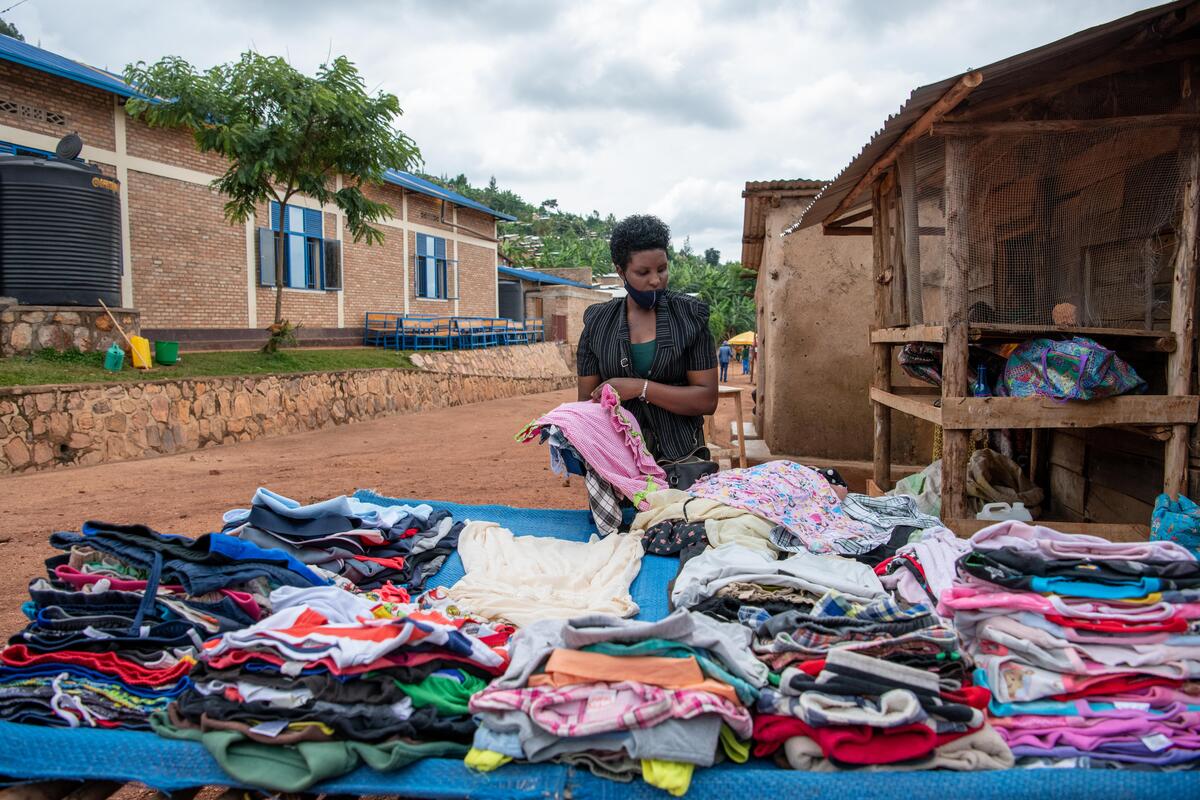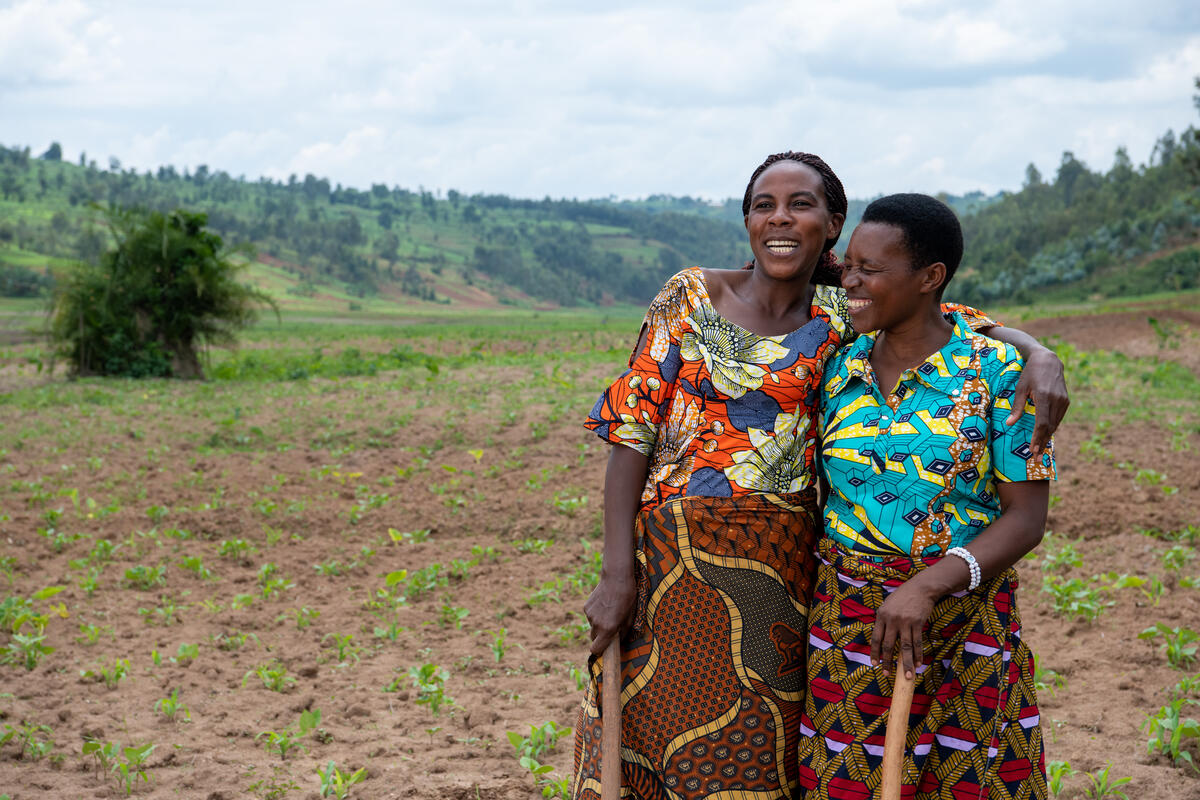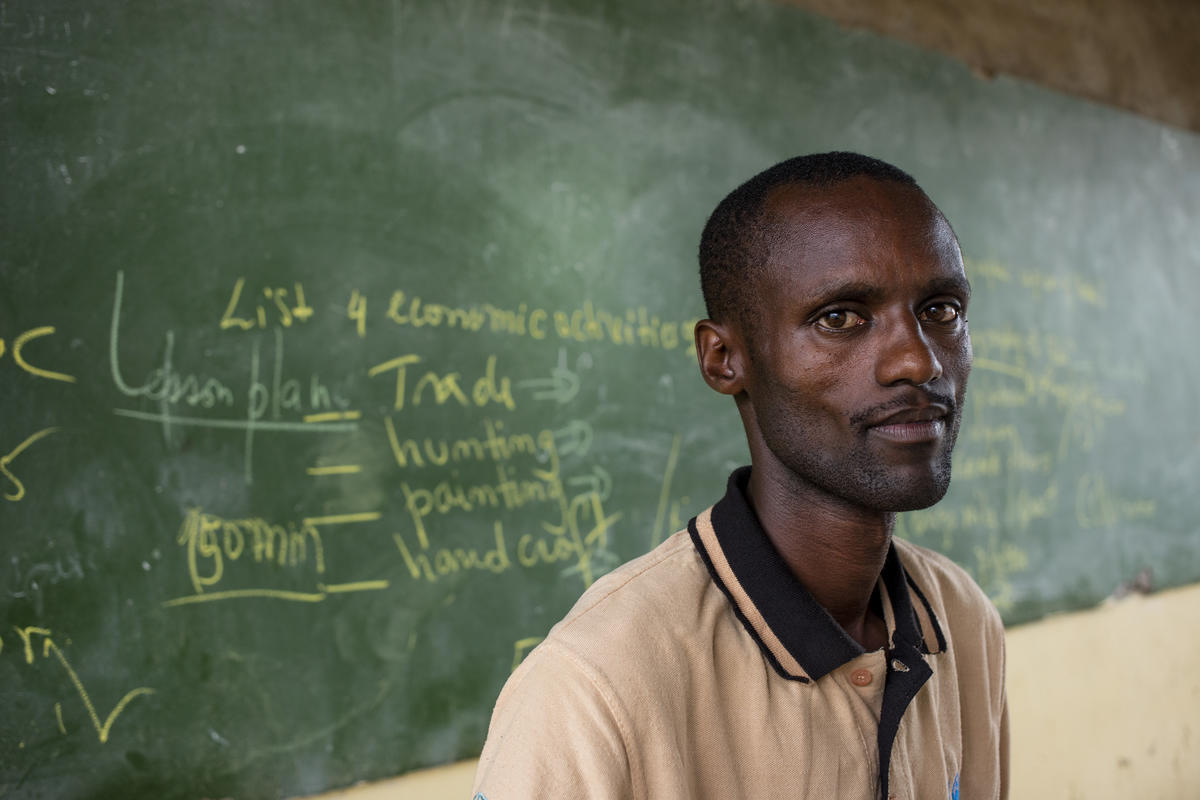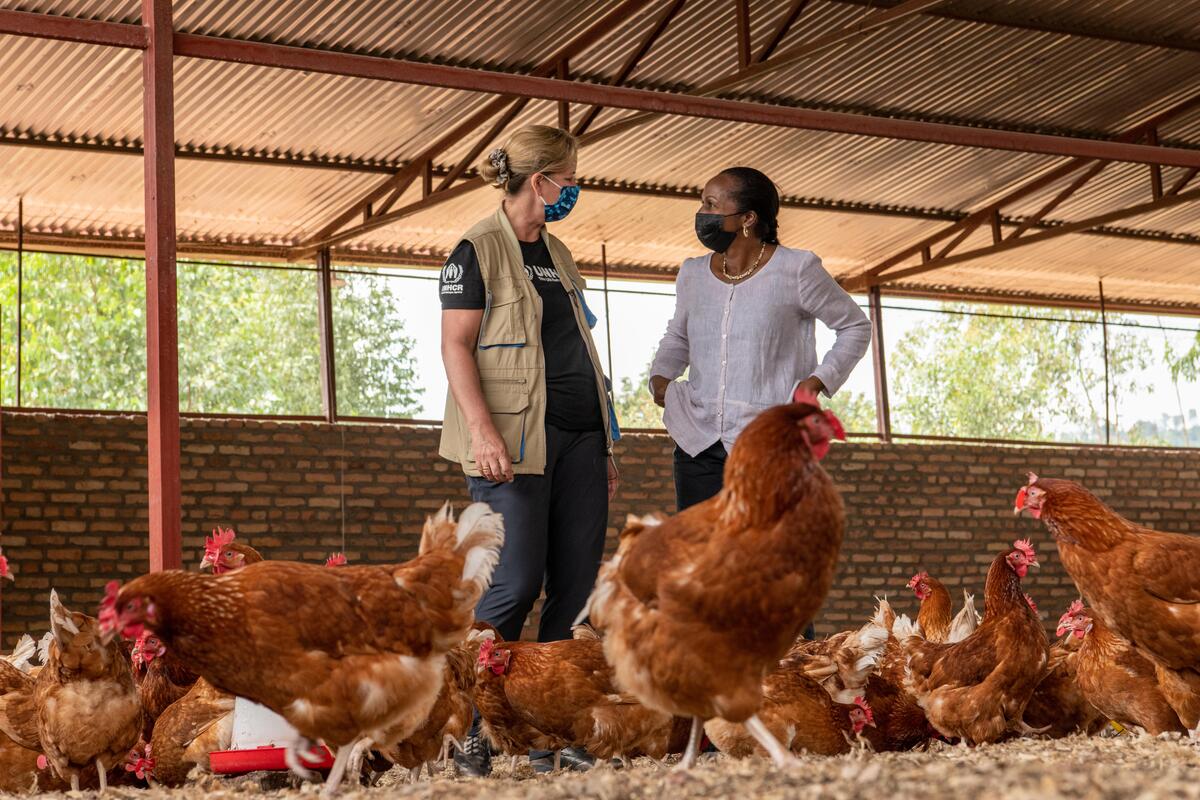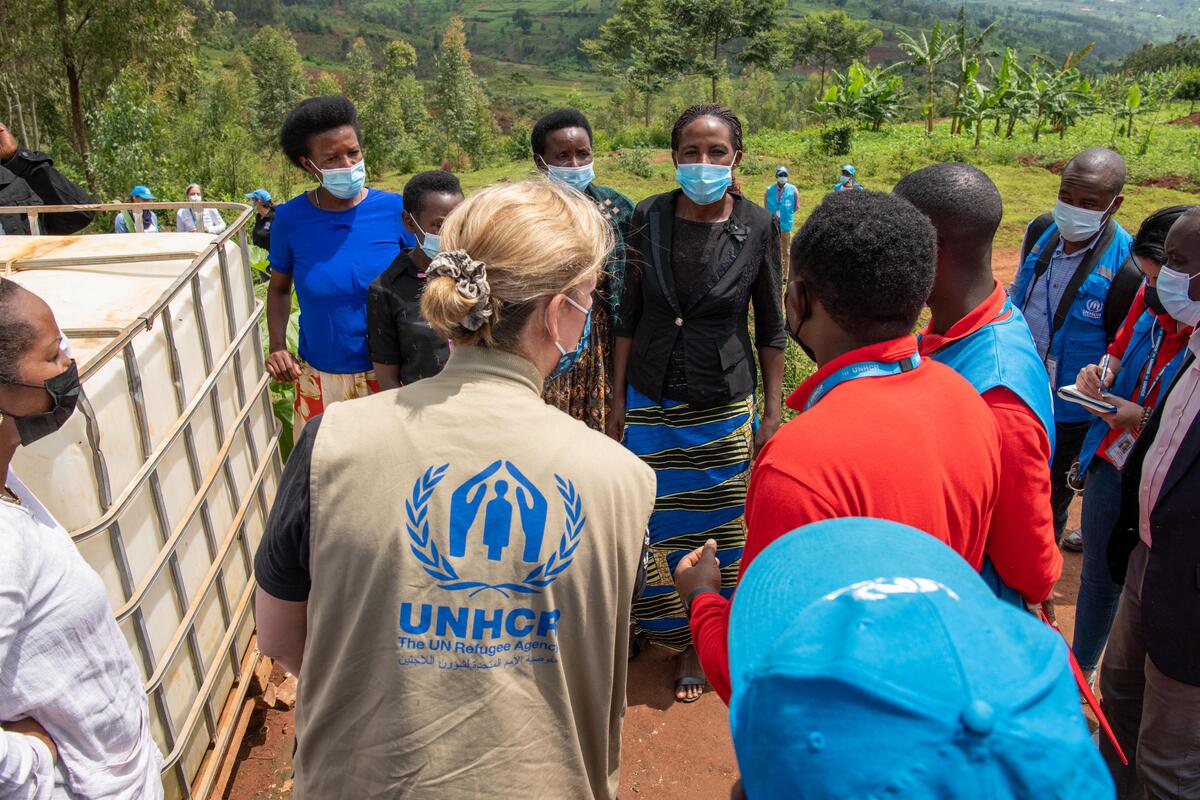A new approach to refugee integration bears fruit in Rwanda
Back in her native Democratic Republic of the Congo, 42-year-old Clementine Bugenimana scraped by as a trader selling foodstuffs. Now a refugee in Rwanda, she has learned how to farm through a programme that is putting food on the table and money in her pocket.
“This project has really changed my life,” she says. “I don’t have to buy maize anymore. I have savings from the money made from farming, which helps me take care of my children.”
At Mugombwa refugee camp, the mother of six works alongside her Rwandan neighbours at the Misizi Marshlands project, an agricultural initiative funded by the IKEA Foundation and supported by the Government of Rwanda.
The programme allocated over 50 hectares of land for some 1,400 refugees and Rwandans to farm together.
Together with her Rwandan friend Mushimiyima Yasinne, she is growing beans and maize in the rich soil, and helping manage the piggeries and poultry farms which are part of the project.
Her new-found success is not accidental. Rwanda hosts over 126,000 refugees and has made notable strides towards improving their lives and that of their host communities as it enacts pledges it made at the Global Refugee Forum in 2019.
“This project has really changed my life.”
Seeking to empower refugees at a time of record global displacement, participants at the multi-sectoral Forum promised to create job opportunities, school places for refugee children, clean energy, infrastructure and better support for host communities and countries, as well as long term solutions like voluntary repatriation and resettlement.
The Misizi marshland project is just one of several initiatives that was launched in Rwanda to meet these objectives. And two years on, a first High Level Officials Meeting, on 14 and 15 December, will provide a temperature check of progress made by various states and actors in fulfilment of the Forum and the 2018 Global Compact on Refugees (GCR).
Participants will identify progress, challenges and where further engagement is needed to increase support, self-reliance and access to solutions for refugees, taking into consideration the challenges posed by the COVID-19 pandemic.
In Rwanda, strides are not just being made in livelihoods. Around 200 kilometres east of Mugombwa near Rwanda’s border with Tanzania lies Mahama camp – home to more than 55,000 refugees – where Burundian refugee Ntariteka Moise, 36, is making a difference to young people through education.
Moise found safety in Rwanda six years ago. Back home, he was an English and Literature student at a local university.
“I continued with my university studies in Rwanda and graduated with a bachelor’s degree,” he says proudly.
He got a job as a teacher at G.S. Paysannat School near Mahama camp, and less than a year later, the school was upgraded to accommode both refugee and Rwandan students as part of Rwanda’s efforts to integrate refugees in the national education system.
The school suffered from severe overcrowding, with over 100 students per class. But thanks to a school expansion project funded by UNHCR, the UN Refugee Agency, over 200 new classrooms were constructed, more than doubling the total and reducing the number of pupils per class to 70.
Cumulatively, UNHCR and partners including the World Bank have supported the construction of over 500 new classrooms in national schools across the country, improving the quality of education – which has boosted attendance rates – and allowing more refugee and Rwandan students to enrol.
“When refugee and Rwandan children study together, they learn from each other and this benefits the entire community,” adds Moise.
The implementation of the GCR in Rwanda allows refugees like Moise to find work, by helping camp-based refugees out of assistance programmes and increasing their access to job opportunities. Moise adds that nearly two thirds of the teachers in his school are refugees, as are a majority of the pupils.
Living near Moise’s school is Burundian refugee Aneilla Nizeyimana, a 30-year-old mother of three. She learned soapmaking back in Burundi, but never had the chance to practice it until she fled post-election violence in 2016 and came to Rwanda, where she realised there was high demand for soap among refugees and the host community.
Starting her soap business was not easy as she lacked the necessary capital and commercial skills. Aneilla was one of 90 refugees who won awards through Youth Connekt – an innovative national platform connecting young people with socio-economic opportunities. She and 89 other refugee entrepreneurs learnt basic business skills and were given seed capital for their business ideas.
“The prize money helped me very much. I bought raw materials to increase my soap productivity,” says Aneilla, who was also able to invest in a smartphone to help promote her business and receive payments using mobile money.
A year later, Youth Connekt injected more capital into Aneilla’s business, allowing her to increase production and supply soap to refugees and Rwandans in the camp and surrounding areas. She currently employs a staff of eight made up of seven Burundian refugees and a local Rwandan. The sole breadwinner for her family of four, Aneilla soon hopes to be able to invest in machinery to further expand her business.
“Rwanda has done an excellent job integrating refugees.”
“My life is better than it was when I arrived in Rwanda. It was very difficult for me to cater to my family … but when I started the project, that’s when I saw some light at the end of the tunnel,” Aneilla says.
She hopes to employ more people in the future.
“I want to help my neighbours and the entire community, and employ many workers and provide job opportunities to the youth,” she adds.
Nayana Bose, UNHCR’s Comprehensive Refugee Response Officer based in Kigali says Rwanda has been impressive with the progress it has made towards meeting its GCR objectives.
“Rwanda has done an excellent job integrating refugees in the national education system, including urban refugees in the national community-based health insurance plan, providing them with national ID cards and offering them livelihoods opportunities,” she explains.
As well as reflecting on the success of such initiatives in Rwanda and other major refugee hosting countries around the world, the High Level Officials’ Meeting will also identify current gaps, seek alternative solutions, and pledge new commitments for refugees and their hosts ahead of the next Global Refugee Forum in 2023.


